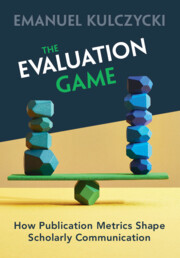
-
Select format
-
- Publisher:
- Cambridge University Press
- Publication date:
- 21 April 2023
- 27 April 2023
- ISBN:
- 9781009351218
- 9781009351188
- 9781009351195
- Dimensions:
- (244 x 170 mm)
- Weight & Pages:
- 0.57kg, 238 Pages
- Dimensions:
- (244 x 170 mm)
- Weight & Pages:
- 0.427kg, 238 Pages
- Subjects:
- Physics and Astronomy, General and Classical Physics, Sociology of Science and Medicine, Sociology
You may already have access via personal or institutional login- Subjects:
- Physics and Astronomy, General and Classical Physics, Sociology of Science and Medicine, Sociology
Book description
Scientific research is communicated, organized, financed, governed, and evaluated through the process of publication. The result of this process is a highly competitive academic environment that rewards researchers for high volume publication, preferably in high-impact journals, leading to the popularised expression 'publish or perish'. Universities and other scientific institutions are under similar pressure, with their aggregated research output being under constant scrutiny. This innovative text provides a detailed introduction to the origin and development of the scholarly metrics used to measure academic productivity, and the effect they have upon the quality and diversity of scientific research. With its careful attention to both the positive and negative outcomes of research evaluation and their distinct expressions around the globe, The Evaluation Game guides the way to a more grounded understanding of metrics, and the diverse academic cultures they give rise to.
Reviews
‘Research evaluation has taken very different forms under different bureaucracies and political systems. Kulczycki makes a unique contribution by explaining some ‘untold histories of research evaluation’ from Eastern Europe and comparing metric-based evaluation models under socialist and neoliberal regimes.’
Ismael Rafols - Centre for Science and Technology Studies (CWTS), Leiden
‘Emanuel Kulczycki is uniquely positioned to provide this highly insightful critique of the relationship between academia and the state in research evaluation systems. In this book, evaluation is not merely an event of which researchers are the sole object or beneficiary but a process that is inextricably tied to issues of trust, communication, discipline diversity and the power of the state. Only by reconciling these relationships can we move to more responsible research evaluation and address academic resistance.’
Gemma Derrick - Centre for Higher Education Transformations, University of Bristol
‘The author uses the metaphor in the title to emphasize the competitive environment in which scientific research takes place. He shows the extent to which research evaluation originates (also) from the government. In this context, he points out a remarkable difference between the West (USA and Western Europe) and the former Eastern Bloc. In the West, researchers have more confidence in colleagues, via peer review, while in the former East Bloc, there is a historic distrust in authorities (experts), and hence a preference for bibliometric indicators. The book draws attention to power relations in science and as such is a useful read, not only for information scientists but also for sociologists and political scientists who want to take a glonacal (global-national-local) perspective.’
Ronald Rousseau - KU Leuven and University of Antwerp
‘… an excellent overview of the operation of state, academic institution and publisher-led systems of research publication evaluation.’
Huw Morris Source: Educational Review
‘… a valuable and exciting contribution.’
Alessia Lo Porto Lefébure Source: Questions de communication
Contents
Metrics
Altmetric attention score
Full text views
Full text views help Loading metrics...
Loading metrics...
* Views captured on Cambridge Core between #date#. This data will be updated every 24 hours.
Usage data cannot currently be displayed.
Accessibility standard: Unknown
Why this information is here
This section outlines the accessibility features of this content - including support for screen readers, full keyboard navigation and high-contrast display options. This may not be relevant for you.
Accessibility Information
Accessibility compliance for the PDF of this book is currently unknown and may be updated in the future.


